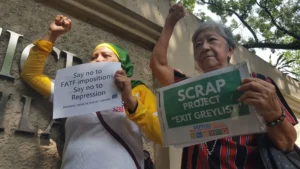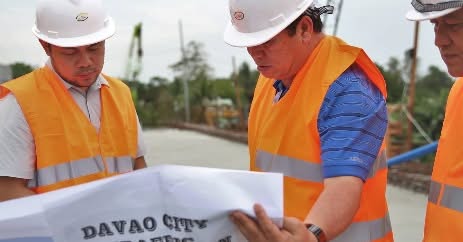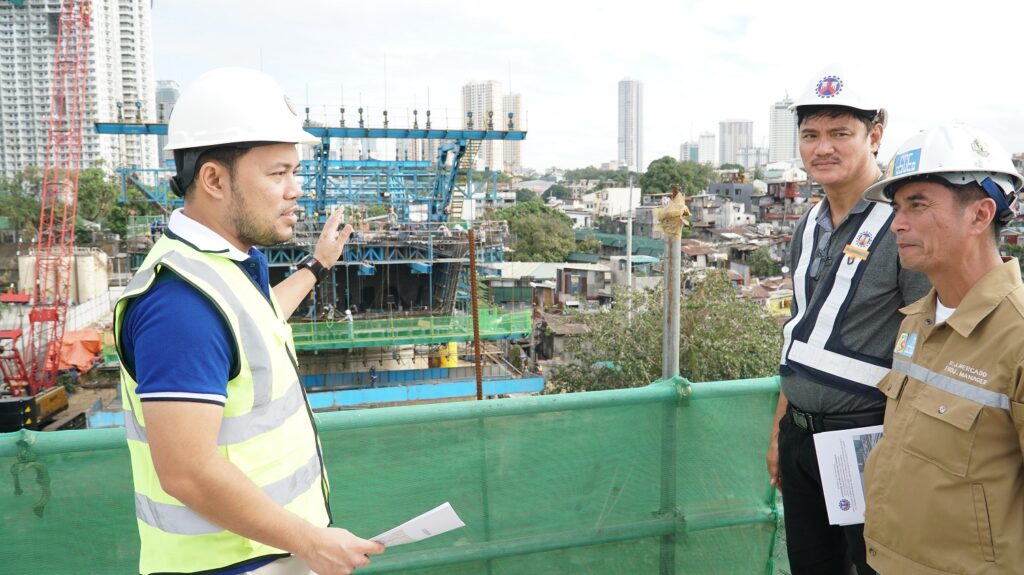📷 Amirah “Mek” Ali Lidasan, a senatorial candidate from the Koalisyong Makabayan, participated in a demonstration outside the Department of Justice to condemn the initiation of terrorist financing charges against activists. She called on the Marcos administration to cease utilizing the Financial Action Task Force’s “grey list” as a means to target civil society. This event took place in Manila, Philippines, on January 22, 2025.(National Union of People’s Lawyers | FB)
The New York-based Human Rights Watch (HRW) has slammed the Marcos Jr. government for filing baseless terrorism financing charges against civil society groups and activists in its attempt to be removed from the “grey list” of a global terrorism financing and money laundering watchdog, the Financial Action Task Force (FATF.)
An FTAF team visited the Philippines last month to find out if the country can be removed from the organization’s list of countries subject to increased monitoring. HRW claimed that the Marcos Jr. regime has “exploiting FATF’s grey-listing to harass organizations and activists in a surge of terrorism financing cases. Many charges have been based on scant evidence that the courts have dismissed.” Thus, government is putting up show trials, disregarding FATF’s guidance that aims to protect non-profit organizations. Being grey-listed could mean, among other impacts, difficulty in accessing international financial markets and reputational damage for the Philippines.
“Philippine authorities appear to be stepping up terrorism financing prosecutions to get off of FATF’s ‘grey list’ and its potential financial cost,” said Bryony Lau, HRW’s deputy Asia director. “This seems to be the government’s latest bad reason to bring baseless charges against civil society groups and activists in violation of their rights.” FATF’s Recommendation 8 on nonprofit organizations requires national authorities to take a “risk-based approach” to address nonprofit organizations potentially being abused for terrorism financing. In October 2023, FATF revised the recommendation, acknowledging that “misapplication and misinterpretation… had led countries to apply disproportionate measures to nonprofits.”
In 2012, the Philippines in 2012 enacted a law on terrorism financing, the Terrorism Financing and Prevention and Suppression Act. The Asia/Pacific Group of FATF found in 2019 that the administration of unlamented president Rodrigo Duterte had not prosecuted anyone for financing terrorism. In 2020, Congress passed the Anti-Terrorism Act (ATA), which has an overbroad definition of terrorism and granted expansive executive powers to the Anti-Terrorism Council (ATC) to designate organizations and individuals as terrorists. ATC could recommend that the Anti-Money Laundering Council (AMLC) freeze the bank accounts of designated terrorists without court approvals. In 2021, the Duterte regime ramped up the filing of terrorism financing cases in the hope the country would be stricken off the “grey list.”
Last year, several individuals were convicted by the courts for financing extremist groups in Mindanao. However, HRW lamented, most terrorism financing cases have been lodged against individuals and organizations that the Philippine government had red-tagged, accusing them of having links with the Communist Party of the Philippines (CPP), National Democratic Front of the Philippines (NDFP) and the New People’s Army (NPA.) Many of the accused were workers and activists with civil society groups, clergy and journalists. HRW argued that “authorities are relying on accounts from alleged former rebels – the same flimsy evidence that the military and the police have long used in politically motivated prosecutions of human rights, environmental, and Indigenous activists, religious workers, journalists, and others.”
For decades, successive Philippine administrations have used “red-tagging” – accusing people of being members or sympathizers of the communist insurgency – as part of its counter-insurgency campaign, violating their basic rights and putting them at risk of physical harm. Individuals recently charged with terrorism financing told HRW that the authorities had previously subjected them to red-tagging, surveillance and online harassment. Red-tagging has been banned by the Supreme Court (SC) but the principal engaged in psywar and covert operations, the National Task Force to End Local Communist Armed Conflict (NTF-ELCAC), continues to harass activists and organize a nationwide network for its propaganda campaign. The Coordinating Council for Private Educational Associations (COCOPEA), which unites private schools nationwide, has withdrawn from NTF-ELCAC as schools have denounced the agency’s tactics.
The National Union of Peoples’ Lawyers (NUPL), which often represents red-tagging victims, has accused the Department of Justice (DOJ) of “weaponization of terror laws to unjustly target activists and civil society organizations” to satisfy FATF’s requirements. In August 2024, United Nations human rights experts expressed alarm over the targeting of civil society organizations and activists, reiterating that “any rights limitations in the name of the fight against terrorism and the financing of terrorism must meet the objective criteria of proportionality, necessity, legality and non-discrimination under international law.”
“FATF should not stay silent while the government is misusing its terrorism financing recommendations to harass civil society groups and activists,” Lau said. “The task force has genuine concerns about terrorism financing in the Philippines, and it should urge the government to address these issues while respecting international human rights law.” The Philippine government has been notorious for manufacturing evidence, with firearms bearing the same serial numbers used as evidence, while in the “walking skeletons” case, the same set of human remains were used as evidence in at least two cases. It can exercise the same illegal practice in terrorism financing cases like those filed against a restaurant owner in Batangas and a store owner in Benguet, the former for selling goods to the “NPA” and the latter for serving food to customers that the military claimed were guerrillas. Both are accused of financing the insurgency. (DIEGO MORRA)




